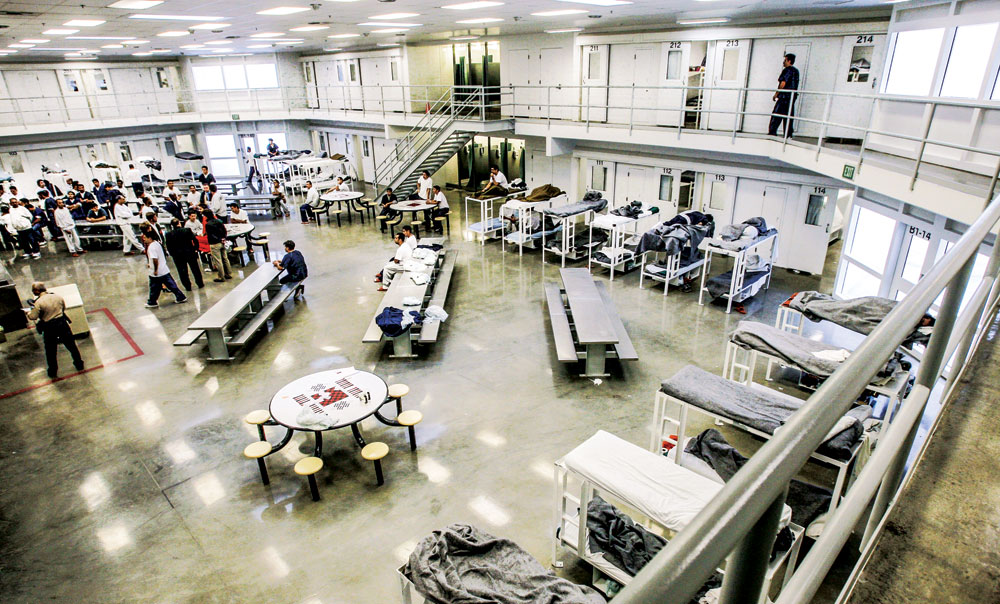
The Front Porch was unable to get inside the ICE Processing Center in Aurora but got permission to use this photo of a similar GEO-run facility in Tacoma, Washington. Immigrant detainees and asylum seekers live in these pods for months or even years. Photo by Drew Perine, Tacoma News Tribune
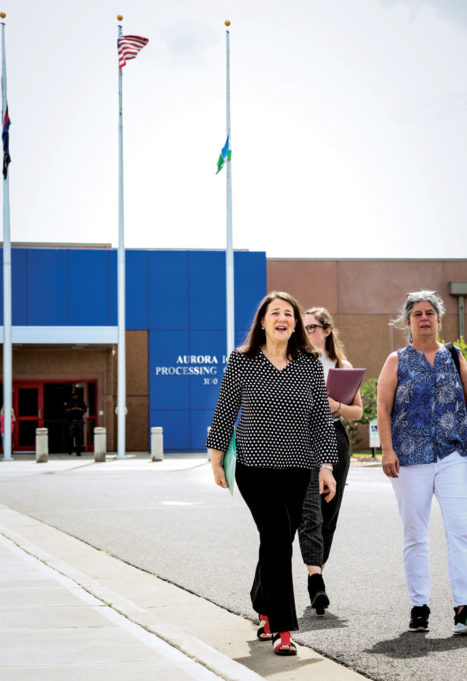
Rep. Diana DeGette at the GEO facility in June 2018, where she met with individuals who had been separated from their children.
A mere mile and a half from Isabella Bird Community School, a school established with a mission to educate “newcomer” refugee and immigrant children, sits a monolith identified as “The GEO Group.” The private facility received its contract under a competitive bid process in December 1986 for approximately 150 detainees. Today, its capacity is 1,500 and its 1,322 residents are as diverse as the United Nations.
“The population consists primarily of recent arrivals seeking asylum,” says Laura Lunn, Managing Attorney for the Rocky Mountain Immigration Advocacy Network (RMIAN). “This means that the majority of people in custody have zero criminal history and have endured horrific past abuses and fear for their lives. Instead of offering them a safe haven we are detaining them in a private prison, a prison that has seven different quarantines active right now,” Lunn told the Front Porch in March.
Publicly Funded but Not Publicly Accountable
This facility was the first of its kind for GEO, the harbinger of a national trend towards privatizing prisons and detention centers. It helped lay the groundwork for GEO to become the nation’s second largest private correctional corporation, with total revenue of $2.26 billion, according to its 2017 annual report.
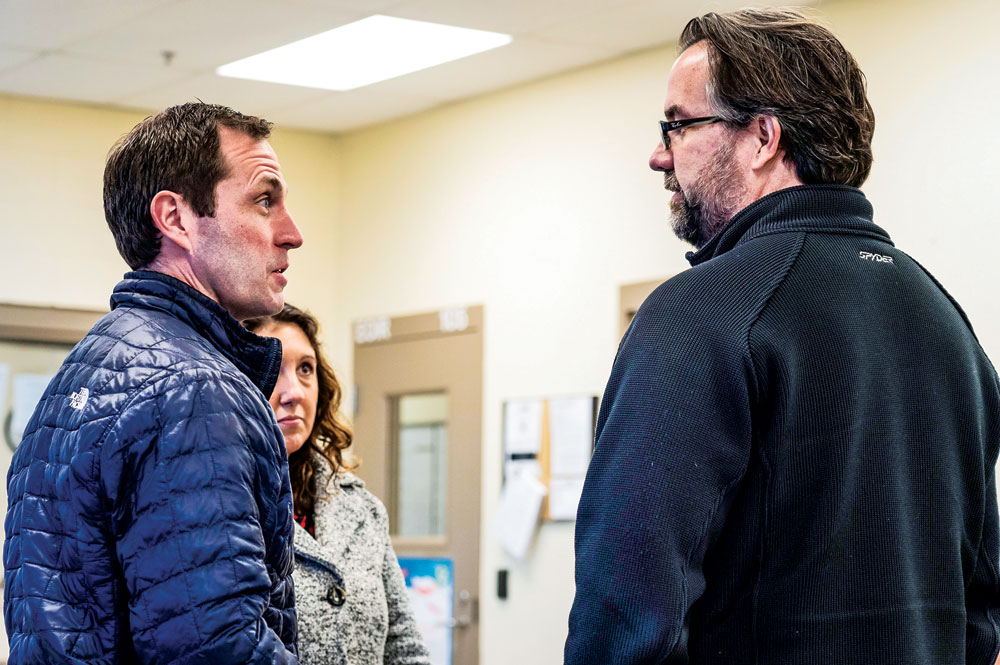
Rep. Jason Crow and Aurora City Councilwoman Allison Hiltz talk to a supervisor at the GEO-run ICE processing center on Feb. 20, 2019. They were turned away on that unscheduled visit but later got an official tour.
Taxpayer dollars fund GEO, but transparency and accountability to taxpayers and elected officials are virtually nonexistent. Rep. Jason Crow (CO-06) was turned away on Feb. 20 when he arrived for a surprise visit after hearing multiple reports of poor living conditions. Crow immediately followed up with letters to then-Secretary of Homeland Security Kirstjen Nielsen inquiring about medical and other concerns, and requested that ICE share with him a copy of its contract with GEO. In mid-April, he reported that he still had not received a response from either Homeland Security or ICE.
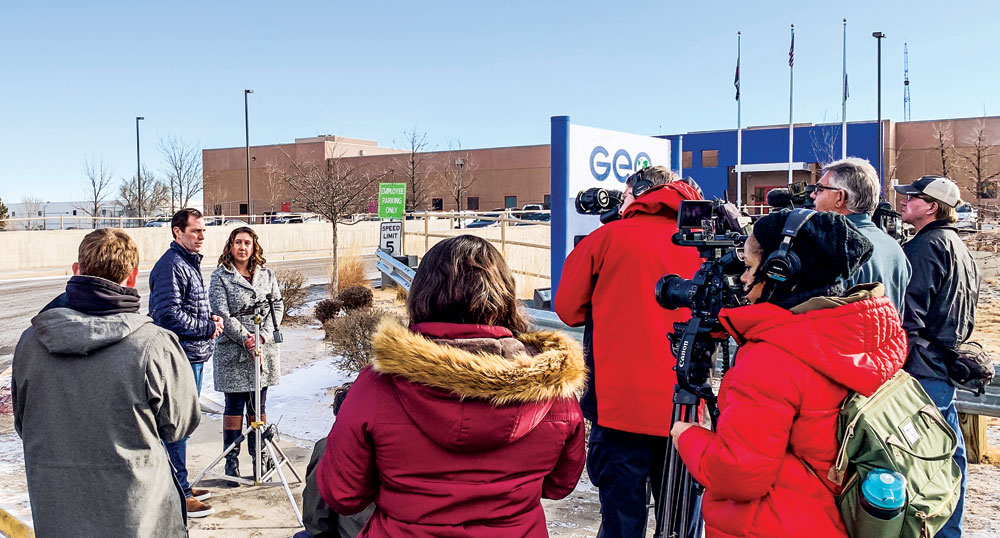
Rep. Jason Crow and Aurora City Councilwoman Allison Hiltz talk to media after their Feb. 20 attempt to visit the GEO-run detention facility.
“The fact that they are sitting on a contract that they could easily send us…begs the question: What are they hiding? The information should be readily available….You have a member of Congress representing a district with a large detention center and Congress appropriates funds for that facility. And this agency [ICE] is unwilling to share a copy of the contract. It is very troubling,” Crow says.
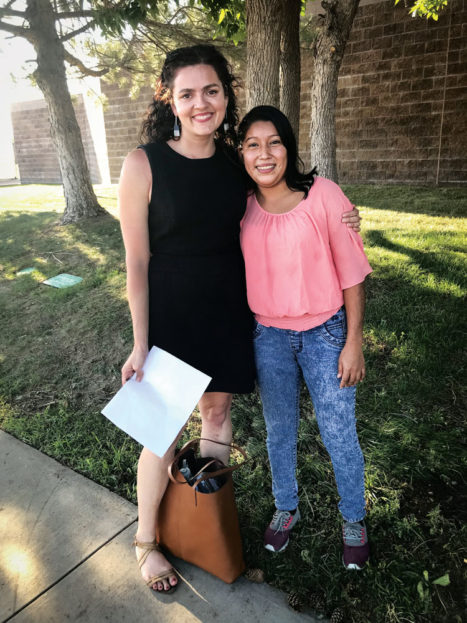
Attorney Laura Lunn, shown with a Guatemalan client released on bond, does not believe asylum seekers should be held in detention facilities.
Crow did get an official tour a few weeks after being turned away, but says he was unable to speak with individuals being held there without staff looking on. Activists assert that inmates are pressured not to talk with outsiders about living conditions. Several individuals shared with visitors off-the-record that they were told by guards that their legal cases would be negatively impacted if they spoke with the media or complained about conditions.
Carl Rusnock, Dallas-based ICE spokesperson for the Central Region, however, says “There is no retaliation. We detain people to remove them,” and adds that detention can go on for months or years due to “aliens who constantly appeal their orders of removal.”
Crow shares a different view: “We have a private corporation that is making a profit off of a federal contract and detaining immigrants. You walk into this place and it’s like walking into a prison. The vast majority of the people detained at Aurora are asylum-seekers, fleeing violence and terrible human rights conditions…and seeking better lives for themselves and their families. They are locked up in what is essentially a private prison. Why do we have an immigration system that imprisons these people?”
Although the GEO facility sits outside of her district, Rep. Diana DeGette (CO-01) “unequivocally opposes” private prisons, saying that “it’s a core duty of a democracy to make government make sure that their prisons are being run in an equitable and safe way.” She does not hesitate to equate the GEO site with a prison, saying “it absolutely has a prison atmosphere.” Crow and DeGette urge constituents concerned about ICE and GEO, to reach out to their offices.*
Prison-like Living Conditions
The facility on Oakland St. between Havana and Peoria houses men and women 18 and over in separate wings. People live in pods of approximately 80-100 during the months they are “detained.” Each pod includes cells with beds, bathrooms, and a day room with board games, TVs for communal viewing, and dining tables. Elizabeth Jordan, Director of the Immigration Detention Accountability Project, understands from her clients that most people share a cell with 1-3 other individuals. They report being locked in their cells several times a day for head count as well as at night after lights out. Even meals and medications are brought in, so people have little opportunity to leave the pods except to see a visitor.
Visitors leave their belongings in lockers and pass through a metal detector before being escorted into a narrow visitation room. This author would describe it as looking like what one sees in prison films: thick smudged glass partitions, dirty phone handsets that may or may not work, and uncomfortable metal stools on both sides. Physical contact is not permitted.
Though the 2011 Operations Manual ICE Performance-Based National Detention Standards governing the facility recommends “at least one hour daily of physical exercise outside the living area, and outdoors when practicable,” some detainees have reported to attorneys and visitors little or no access to the outdoors. Based on her conversations with clients, Jordan says “The outside area is an entirely concrete alleyway between two adjacent pods, with caging on top, where people can play handball.”
ICE spokesperson Rusnock and Denver-based ICE Public Affairs Officer Alethea Smock told the Front Porch that all inmates have access to the outdoors.
Criminals Get Counsel, Asylum Seekers Don’t
Though some detainees have family or supporters who have raised funds to provide them with legal help, RMIAN is the only nonprofit providing legal services to those confined here. Lunn estimates that less than 10% of the population had access to counsel before the facility increased its numbers by about 40% in early 2019. This means that well over 90% of those housed at GEO navigate a complex and confusing legal system without guidance, with limited access to law books, limited English skills, and under circumstances that would be trying to anyone.
In the criminal context, most people arrested by the police are eligible to be released on bond or bail prior to trial. The same is not true in the immigration context. As a result, an individual might spend years fighting their civil immigration case while in detention. “Immigration law is administrative law, so overstaying a visa is similar in scope to getting a traffic ticket, but the repercussions are very different,” states Lunn.
Lunn would like to see an end to civil detention of those seeking asylum or otherwise hoping to appeal an immigration decision. Barring that, she says “the best stopgap is to provide people with attorneys and be able to pay attorneys for that work like we have public defenders in the civil context. If you are treating detained people as criminals, it makes sense to afford them counsel to preserve their due process rights.”
Rusnock, an 18-year ICE veteran, has a different perspective: “We are in the business of enforcing immigration laws. Individuals who violate them must be detained in a facility to ensure they are removed to their country of origin as soon as practicable.”
DeGette counters that “Most of the individuals being held right now are being held because they have a claim for asylum. They are not being held on a criminal charge.” The former attorney shares, “I think they’re trying to wear them down so they give up, and they’re trying to dissuade other people from coming.”
Jordan agrees. “Asylum-seekers are not risky or dangerous. They overwhelmingly turn up for court….ICE is trying to pressure people to give up their claims by putting them in prison. The whole system is rotten.”
Addressing Health Issues from Chicken Pox to Trauma
On April 9 the ACLU sued ICE for information on the death of Kamyar Samimi while in custody at the GEO facility in 2017. Another man formerly held at the facility is also suing, claiming he received inadequate medical treatment while in detention. Jordan says the facility only has one full-time doctor and even an issue as simple as repairing a hearing aid required several months of legal advocacy on behalf of a client. For people with more serious needs, care is even more challenging, as bulging hernias and respiratory issues remain untreated for up to a year. “Very little mental health support exists for people housed there, most of whom have experienced trauma. In addition to a lot of language barriers, there is a lot of cultural incompetence on the part of staff.” Jordan shares.
Earlier this year, several outbreaks of chicken pox and mumps led to quarantines at GEO. Crow recalls learning about these cases as a result of a lawyer in the waiting room sharing the information with him. “I remain concerned as to why there wasn’t proper disclosure from GEO and ICE to local health officials,” says Crow. The quarantines in turn impeded lawyers’ access to clients, resulting finally in the introduction of video conferencing. In cooperation with Tri-County Health Department, GEO began providing vaccinations to employees as well as people detained at the facility. As of mid-April, the total number of confirmed cases were: 15 cases of mumps and 9 cases of chickenpox.
Stapleton mom Dr. Janine Young, who is the Co-Medical Director of the Denver Health Human Rights Clinic (HRC), along with her HRC colleagues regularly see clients at the GEO facility. Since October 2018, they have been performing physical and mental health forensic exams for those interned at GEO who may qualify for legal status. “We diagnose signs of torture like blunt force trauma, broken bones, and concussions as well as PTSD, sexual abuse, rape, female genital cutting and other conditions that are grounds for asylum.”
According to Dr. Young, in combination with appropriate legal representation, skilled medical and/or mental health evaluations significantly increase the success rates for those seeking asylum. “These are all people who are seeking better lives for themselves and their kids like any of us would. They have the same concerns with their children that we do—are they growing, thriving, eating well?” She expresses gratitude for funders including Denver Health, the Rose Family Foundation and Caring for Colorado; however, the need is great and donations and skilled professionals are always welcome. Reach out to Robin Engleberg at the Denver Health Foundation if you would like to support the program: robin.engleberg@dhha.org.
*Contact Reps. Crow and DeGette: https://crow.house.gov/contact/email-me, https://degette.house.gov/contact/send-me-an-email



0 Comments